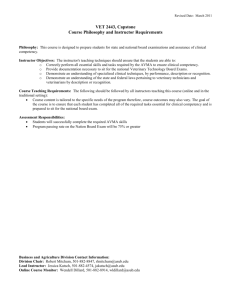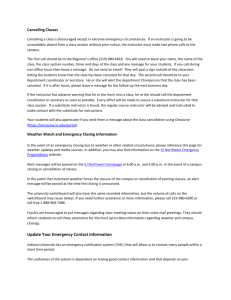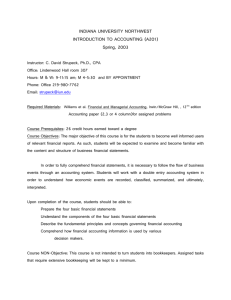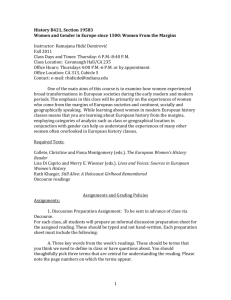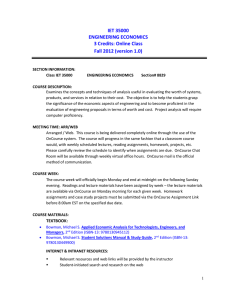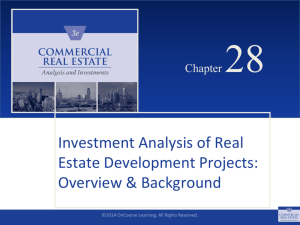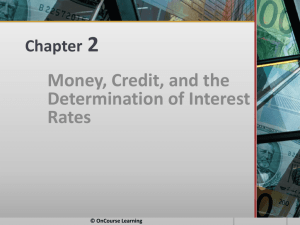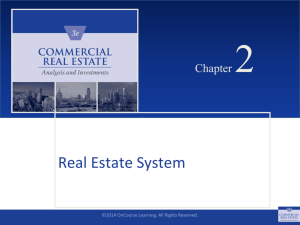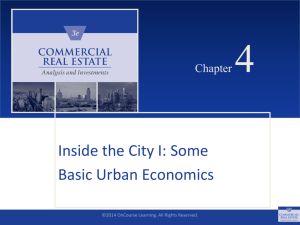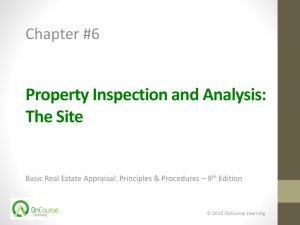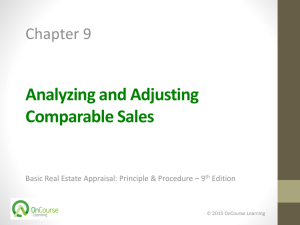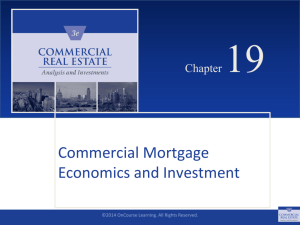HPER P105: Foundations of Fitness and Wellness
advertisement
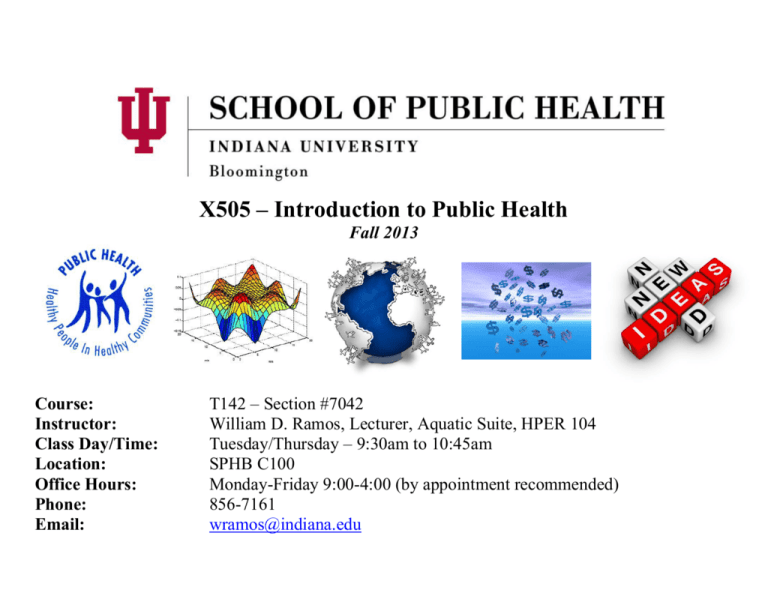
X505 – Introduction to Public Health Fall 2013 Course: Instructor: Class Day/Time: Location: Office Hours: Phone: Email: T142 – Section #7042 William D. Ramos, Lecturer, Aquatic Suite, HPER 104 Tuesday/Thursday – 9:30am to 10:45am SPHB C100 Monday-Friday 9:00-4:00 (by appointment recommended) 856-7161 wramos@indiana.edu Course Description Students will develop an understanding of the five core disciplines of Public Health and draw logical connections within their concentration of study. Course Learning Outcomes: 1. Students will be able to summarize the historical and social contexts through which the field of Public Health has developed in the United States 2. Students will be able to describe the manner in which basic concepts , theories, and methods of the five core areas of public health are applied to health-related research, policy, and practice 3. Students will be able to distinguish efforts through which organizations and institutions at local, national, and global levels seek to assure the health of the public 4. Students will be able to analyze the manner in which their specific discipline is related to a multidisciplinary approach to achieving public health goals. Expectations of Students: 1. Complete all reading assignments prior to class. 2. It is expected that students will actively participate in discussions during class. 3. Attend all class sessions 4. Arrive to class on time and fully prepared to engage 5. Complete all course assignments as directed and submit them when they are due. 6. Respect the diversity, opinions, and learning culture of others. Book/Material Requirement: Schneider, Mary Jane (2012). Introduction to Public Health, 4th Edition. Additional readings will be posted under “resources” Oncourse: Oncourse will be used in this course as a communication tool among the students and instructors. Important information about the course will be posted on Oncourse, including grades. Using Oncourse is a requirement for this course. The only part of On Course that will not be utilized is email. You should email the instructor at wramos@indiana.edu Evaluation and Grading Policies: Attendance and Absences: 1. You are allowed two days per semester for illness or personal issues. You may take these two days without penalty; however, you should notify the instructor on the day you return by turning in the appropriate Sick/Personal Day form located in on course under “resources”. Any assignment due on a date missed may be turned in late with the Sick/Personal Day form attached. 2. You will receive a bonus of five (5) points for each unused day at the end of the semester. 3. If you miss more than the allotted three days of class, you will be penalized for each day afterwards. A deduction of ten (10) points for each additional day will be subtracted from you total score at the end of the semester. 4. Arriving late enough to be denied admission to a class session will be considered an absence. 5. Assignments missed on excused days may be submitted at the next class only without penalty. In class activities for points may not be made up if missed. Remember, “Some moments come and are just then gone!” Try your best not to miss them! 6. Exam days are excluded from the attendance policy and should not be missed. Punctuality – Timeliness is a positive trait related to professionalism; tardiness and early departures are expressions of disrespect to the instructor, fellow students, and guests. Once class has begun, students are not allowed to enter the classroom unless a break is taken. If you are allowed to enter late you still may not be able to sign in the attendance sheet for that day but are more than welcome to absorb all of the valuable information presented!! Summary of Points: Point Distribution: Maximum Points Possible: Competency Tracker: Start Up 10 points Competency Tracker: Conclusion 10 points Discretionary/In-Class Activities 50 points Read-Aheads 50 points Historical Context Paper 20 points SPHB Faculty Insight Interview 20 points Concentration Connectivity Paper 50 points Midterm Exam 50 points Final Exam 60 points Total Points Possible: 320 points Point Grading Scale: The following scale will be used to interpret point values when assigning grades. A 90%+ B 80%- 89% C 70% - 79% D 60% - 69% F Below 60% Competency Tracker: Start Up / Competency Tracker: Conclusion (20 points) Students will be required to complete the on-line public health competency tracker at the beginning and at the conclusion of the course. Deadline dates will be announced during the course. Discretionary / In-Class Activities: 50 points In-class activities will serve as class participation points during lecture. These activities will vary throughout the semester. Students must be present in lecture to be eligible for participation points. Since these points are acquired in the moment they cannot be made up. Read-Aheads: 50 points (5 x 10 points) Selected reading assignments will include 10 question, multiple choice assessments over concepts and information. Read-Aheads are to be completed using OnCourse Tests & Surveys and must be submitted prior to a given class. SPHB Faculty Insight Interview (20 points) Students will conduct an interview with a faculty member within their concentration to discuss their perception of the field and give direction to how they may connect with goals of public health. This is assignment is designed as a precursor to work on the Concentration Connectivity Paper. Concentration Connectivity Paper (50 points) This paper will reflect an overview of research in your concentration and a synthesis on how you feel your discipline is connected to the core public health. Midterm Exam (50 points) - TBA Final Exam (75 points) - TBA Course Evaluation: It is the policy of the School of HPER to evaluate all courses taught through the School. Final course evaluations will be conducted in a manner that maintains the integrity of the process and the anonymity of evaluators. Academic Integrity: You are expected to observe high standards of intellectual integrity and honesty. Academic dishonesty includes: cheating on assignments/quizzes/exams, presenting work that is not your own work, allowing your own work to be misrepresented, and turning in another students’ work. Academic and personal misconduct by students in this class are defined and dealt with according to the procedures in the Code of Student Rights, Responsibilities, and Conduct. Please note that this policy includes both personal and academic integrity. Not all infractions which occur within the classroom are necessarily academic, but rather can be considered as personal misconduct. Professionalism Policy: Carrying on personal conversations, text messaging, emailing, and answering cell phones is disruptive to the class and interferes with student learning. Please turn your cell phone on silent upon entering the classroom. Surfing the web, doing work for other courses, reading the newspaper, doing crossword puzzles, etc. is considered disrespectful to both fellow students and the instructor. Religious Observations: In accordance with the Office of the Dean of Faculties, any student who wishes to receive an excused absence from class must submit a request form available from the Dean of Faculties for each day to be absent. Information about the policy on religious observations can be found at the following web site: http://www.indiana.edu/~deanfac/holidays.html#reco. You can download the request form at: http://www.indiana.edu/~deanfac/download/rel_obs.html#holreq Note: This form must be presented to the course instructor by the end of the second week of the semester. Students with Special Needs: Please see the instructor during the first week of class if you have needs that require special assistance http://www2.dsa.indiana.edu/dss/ Tentative Course Outline Week 1 8/27 & 8/29 Tuesday Lecture Course Introduction/Orientation Rules of the Game Thursday Lecture Overview of Core Disciplines and Collaborative Mission Michael Reece – The Big Picture 2 9/3 & 9/5 Examining the Meaning and Scope of Public Health How Do We Know What We Know? The Role of Epidemiology Beth Meyerson Ka He 3 9/10 & 9/12 4 9/17 & 9/19 APPLIED EPIDEMIOLOGY: UNDERSTANDING NUTRITION AS CRITICAL COMPONENT OF PUBLIC HEALTH APPLIED EPIDEMIOLOGY: PHYSICAL ACTIVITY AND PUBLIC HEALTH Ka He Jan Wallace ACTIVITY: EPIDEMIOLOGY AND MULTIDISCIPLINARY APPROACHES TO PUBLIC HEALTH Historical Foundations of Public Health –Part I Dr. Ruth Engs PEER GROUP EXERCISES 5 9/24 & 9/26 6 10/1 & 10/3 Historical Foundations of Public Health –Part II Essential Biostatistics Dr. Ruth Engs M. Aaron Sayegh Applied Biostatistics in Public Health: HOW STATES USE BIOSTATISTICS TO UNDERSTAND PUBLIC HEALTH PRIORITIES STATISTICAL APPLICATIONS IN UNDERSTANDING THE ROLE OF RECREATION AND HEALTH M. Aaron Sayegh EXAMPLES FROM THE TEXAS STATE OFFICE OF HEALTH STATISTICS Barb Hawkins 7 10/8 & 10/10 8 10/15 & 10/17 Social and Behavioral Determinants of Health Social and Behavioral Determinants of Health Laura McCloskey Laura McCloskey SOCIAL AND BEHAVIORAL DETERMINANTS OF PHYSICAL ACTIVITY MIDTERM EXAM Jeanne Johnston 9 10/22 & 10/24 SOCIAL AND BEHAVIORAL DETERMINANTS OF RECREATION SOCIAL AND BEHAVIORAL DETERMINANTS OF SEXUAL HEALTH: METHODS AND TRANSLATION TO PRACTICE Bryan McCormick Debby Herbenick 10 10/29 & 10/31 11 11/5 & 11/7 12 11/12 & 11/14 Environmental Health Applied Environmental Health in Public Health Jim Klaunig Lisa Kamendulis SYNERGIES BETWEEN ENVIRONMENTAL HEALTH AND RECREATION Impact of Parks and Recreation: Eppley Institute at Work Alan Ewert Steve Wolters HOW PUBLIC HEALTH HAPPENS IN THE US: UNDERSTANDING THE FOUNDATIONS OF HEALTH MANAGEMENT AND POLICY GOVERNMENT AND PUBLIC HEALTH Beth Myerson Beth Myerson 13 11/19-11/21 COMMUNITY ORGANIZATIONS AND PUBLIC HEALTH RECREATIONAL ORGANIZATIONS AND PUBLIC HEALTH Priscilla Barnes Chris Geary or Chris Arvin?(IURS) 14 11/26 & 11/28 Thanksgiving No Class No Class 15 12/03 & 12/05 Health Disparities PUBLIC HEALTH ACROSS THE LIFEPSAN Michael Hendryx Lesa Lorenzen-Huber 16 12/12-12/16 Trends and the Future of Public Health Final Thoughts and Final Exam Review David Lohrmann Dean Mohammed Torabi Final Exam - Tuesday December 17th, 10:15 - 12:15pm


